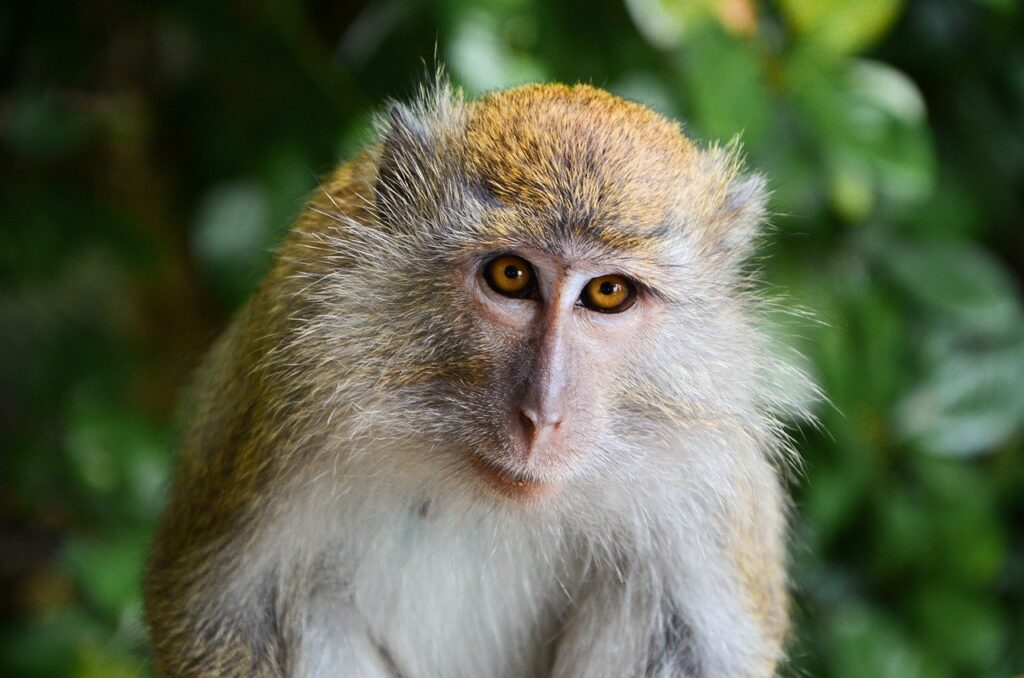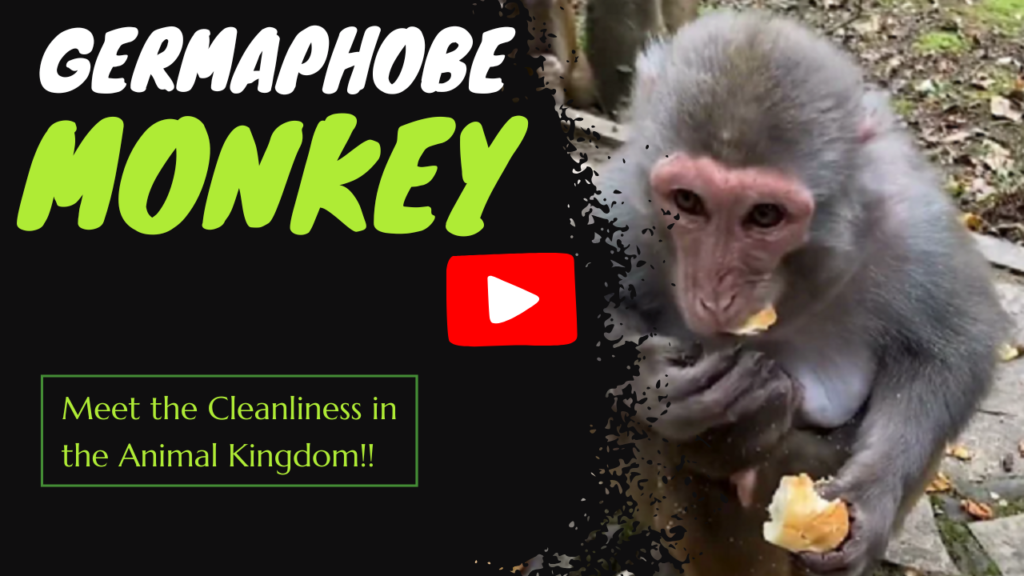
Welcome to the world of germaphobe monkey. These monkeys are known for their love of cleanliness. They show how important hygiene is in their lives and how it affects their social life.
Let’s explore how cleanliness helps them survive and thrive. We’ll see how it shapes their social structure and health. Join us as we learn more about these clean animals and their grooming habits.
Key Takeaways
- The term “germaphobe monkey” highlights primate cleanliness habits.
- Hygiene behaviors are essential for social dynamics among primates.
- Understanding cleanliness can reveal survival strategies in nature.
- Research shows germaphobia may stem from a fear of contamination.
- Cleanliness practices vary greatly among different species.
Introduction to Germaphobe Behavior in Primates
Germaphobe behavior in primates is all about cleanliness and survival. Many species keep clean to stay healthy and maintain social order. They groom to remove dirt and parasites, keeping everyone safe from diseases.
Being clean is not just a choice; it’s an adaptation. Clean primates avoid dirty places with harmful germs. This shows how important cleanliness is in their social lives.
Animal grooming is about staying clean and building social bonds. By grooming each other, primates look good and strengthen their friendships. This shows how vital cleanliness is for their societies.
In short, germaphobe behavior in primates highlights the role of hygiene in their lives. It affects their health and social bonds. Studying these behaviors helps us understand how primate societies evolve.
The Fascinating World of the Germaphobe Monkey

The germaphobe monkey is very interesting. They love to stay clean. This makes them stand out in their group.
They are known for being very clean. This helps them get along better with others. It also keeps them healthy.
Defining the Germaphobe Monkey
A germaphobe monkey loves to be clean. They spend a lot of time grooming themselves. This makes them popular in their group.
Being clean is important for them. It helps them make friends and stay healthy. Scientists study them to learn about cleanliness in animals.
Habitat and Behavior
The place where a germaphobe monkey lives affects how clean they stay. They need a clean space to thrive. This helps them live better together.
Being clean helps them work together. It keeps them healthy and stops the spread of sickness. Their love for cleanliness makes them special in animal studies.
Hygiene in the Animal Kingdom

Hygiene is key for animals to survive and live together. They do many things to stay clean. This keeps them healthy and helps them get along better.
Examples of Cleanliness Among Different Species
Many animals are very clean. Elephants dust bathe to stay free from bugs. Birds preen to keep their feathers in top shape. These habits show how cleanliness is important for health and social standing.
Importance of Hygiene in Primate Social Structures
For primates, being clean is crucial for their social life. Grooming helps remove dirt and parasites. It also builds trust and strengthens group bonds.
The Role of Hygiene in Survival and Adaptation
Being clean helps animals survive. It keeps them from getting sick, which is big in the wild. Animals that stay clean live longer and do better in different places
Germaphobe Monkey: What Makes Them Unique?
Germ-fearing primates have special behaviors that set them apart. They focus a lot on staying clean. This helps them in many ways, like how they interact and stay healthy.
Being clean is very important for these monkeys. It helps them in their social group. Clean monkeys are seen as leaders and have better friendships. This means they get more food and support.
These monkeys show how cleanliness and social life are connected. Their clean habits help them survive and thrive. It also helps them make strong friendships and share resources.

These monkeys’ love for cleanliness is very interesting. By studying them, we learn a lot about their social lives. Their cleanliness is key to their survival and how they live together.
| Behavioral Traits | Social Implications | Survival Advantages |
|---|---|---|
| High grooming frequency | Enhances social bonds | Reduces disease spread |
| Regular cleaning of living areas | Establishes social hierarchy | Increases resource availability |
| Group grooming sessions | Strengthens community ties | Facilitates cooperative behaviors |
Obsessive Monkey Habits and Their Significance
Understanding monkey habits shows us a lot about their social lives. These habits often look like grooming, showing how clean they like to be. This primate obsession helps keep them clean and strengthens their bonds.
Monkeys do these rituals every day. They show that grooming is important for both their bodies and minds.
Understanding Obsessive Behavior in Primate Groups
Monkey habits vary, but they share common reasons. These reasons often come from their environment. When monkeys are stressed or their homes are changed, they groom more.
Grooming is a way for them to cope with stress and stay connected. These habits show how important they are for the group’s unity and comfort.
Impact of Environment on Obsessive Grooming Habits
Environment greatly affects monkey grooming habits. Changes like deforestation or more humans around can make them groom more. This shows how they adapt to stress and keep their social order.
It shows how monkeys adjust their grooming to deal with stress and keep their group together.
The Relationship Between Cleanliness and Social Interactions

Cleanliness is key in how monkeys interact with each other. Grooming helps remove dirt and parasites. It also helps monkeys bond and figure out who’s in charge.
When monkeys groom, they strengthen their friendships. This shows how cleanliness and behavior are important in their lives.
Studies show that how clean a monkey looks can change its social standing. Monkeys who keep themselves clean are liked more by others. This shows grooming’s role in keeping the group together.
Keeping clean helps monkeys live in harmony. Cleanliness and behavior are crucial for their social balance. This makes them essential for monkey societies.
Conclusion
The germaphobe monkey shows us how important cleanliness is in the animal world, especially for primates. These animals show that being clean helps them stay healthy. It also helps them get along better with each other.
Humans also value cleanliness. We have our own ways of staying clean, just like the monkeys. This shows that keeping things clean is important for everyone, not just animals.
Learning about germaphobe monkeys helps us see the value of cleanliness. It makes us think about how we keep ourselves clean. This can help us live healthier lives.
FAQ
What defines a germaphobe monkey?
A germaphobe monkey loves to groom itself a lot. It also hates dirty places. These habits keep the monkey’s community healthy and in order.
Why is hygiene important for primates?
Hygiene is key for primates to stay healthy. It helps them avoid getting sick and keeps their social bonds strong. Grooming is a big part of this, helping the community stay well.
Snuggle up with the most adorable Capuchin plush, Monkey – Click here to get your Wild Republic Cuddlekins today
How do environmental factors influence monkey cleanliness behaviors?
Things like where they live and how stressed they are can change how monkeys clean themselves. For example, a new environment might make them groom more.
Are germaphobe behavior traits seen only in monkeys?
No, many animals, not just monkeys, are clean freaks. They groom and clean themselves to survive and get along with others.
How does social structure relate to hygiene behaviors in primates?
Grooming is like glue for monkeys, holding their social groups together. Being clean can even affect who’s in charge, showing how important it is.
What evolutionary benefits do germaphobe behaviors provide?
Germaphobe behaviors help monkeys stay healthy and keep their communities strong. They’re key for survival, keeping sickness away and building strong bonds.
Why billionaires use ‘BioWave Power Generators’ in their homes!?